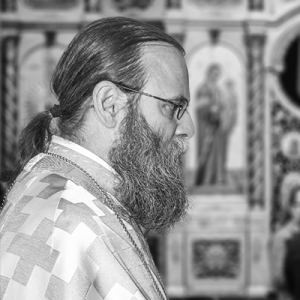“Walking the Talk”
— Fr. Bohdan Hladio
June 2008 A.D.
Ten years ago the UOCC began the process of updating her Statute and By-laws. A first draft of the proposed by-laws was circulated in 2002 for review and comment. In 2005 the current By-laws committee began reviewing and revising this document based on the comments which had been received. In August of 2007, after much deliberation, research, and hard work, the committee felt comfortable presenting the revised proposed By-laws for consideration and potential ratification.
Following circulation of the proposed revised by-laws to all clergy and congregations of the UOCC and presentations at the diocesan conferences in the autumn of 2007 they were given preliminary approval by the full Consistory in November of 2007, and a plan was implemented to solicit submissions from all clergy and congregations of the UOCC.
Over 25 submissions were received. They were circulated to all committee members in April, and prior to the full Consistory meeting in May the By-laws committee met for two full days to review them. Certain suggestions were deemed impractical, a few consisted of questions rather than suggested changes (which were often just as valuable in helping the members of the committee during their deliberations), and others contained excellent proposals regarding revisions.
Following two days of intensive work, the by-laws committee was able to achieve consensus on a final version of the proposed revised by-laws incorporating many of the proposed changes. This final version was presented to the full Consistory for a decision as to whether this document might be presented at the Extraordinary Sobor in August of 2008 for discussion and potential ratification. After careful deliberation the Consistory passed a motion to do so.
The process of drafting, revising, considering, re-considering, and finalizing the wording of the proposed revised by-laws has proved both exhilarating and frustrating. The committee members were very impressed by the quality of the submissions of many individuals and congregations. We truly have many intelligent, competent, and dedicated members of the UOCC who deeply care for their Church. It was an honour to receive both their accolades and their constructive criticism.
At the same time this Sobor mandated by-laws revision has met with resistance from certain groups and individuals. As we all know, there is a difference between constructive criticism (which is always welcome) and obstructionism, mistrust, misapprehension or even hostility.
A person’s reaction to a particular stimulus says more about the person than it does about the stimulus. Based on several reactions which the circulation and presentation of the proposed revised by-laws have elicited it has become evident that certain members of the faithful hold fundamentally misguided ideas about what by-laws are, what the Church is, and even about the Orthodox Christian faith.
In order to arrive at a correct conclusion we require correct information. In order to make a wise decision, we require not only information but understanding. In order to make a proper spiritual decision we require spiritual maturity and insight.
Notwithstanding the fact that church by-laws exist for governmental rather than ecclesiastical reasons, it was interesting to go through the submissions and count the times words such as “Church”, “Christ”, “Gospel” and their derivatives were used to support arguments or suggested revisions, and then to count the times “Ukraine”, “Canada”, or “Autocephalous” and their derivatives were used.
Questions such as “How will these proposed revisions encourage people to become members of the church?” also point to a misunderstanding of what by-laws are and what the Christian faith is. I have never heard of anyone joining a church because they liked the by-laws. I know many people who join a parish because they find Truth, Beauty, and true Christian Love manifested in the liturgical, educational and social life of the parish – in other words, a parish where the members “walk the talk”.
Given the diligence, resources, and passion obvious in some of the submissions I also couldn’t help thinking that if on an annual basis parish councils or parishioners would put as much time and energy into lobbying the government in support of traditional marriage, fighting against abortion, helping the poor, etc. as certain parishes and individuals obviously devoted to reviewing the proposed by-laws our Church and society would be in better shape, and God would be more greatly glorified. This isn’t to say by-laws are unimportant, only to say that first things should be put first.
The Church exists to preach, teach and help people live out the Gospel of Jesus Christ. Unless we know and live the Gospel we will have nothing constructive to contribute to a discussion on by-laws, or indeed on any issue regarding the Church or the faith.
What does it mean to live the Gospel? What are the fundamental activities that a person who claims to be an Orthodox Christian must engage in?
I believe that there are nine activities fundamental to the formation and maintenance of an Orthodox Christian conscience and way of life: prayer, fasting, deeds of mercy, worship, spiritual reading, participation in the holy mysteries, participation in the communal life of the parish, moral conduct, and Christian witness in our daily life.
During the next nine months each of these activities will be presented in detail in this column. The aim is to assist all those struggling to live a Christian life in doing so, and to help those who have questions as to what the essentials of the Christian life, the Orthodox Faith, and the Church really are.

